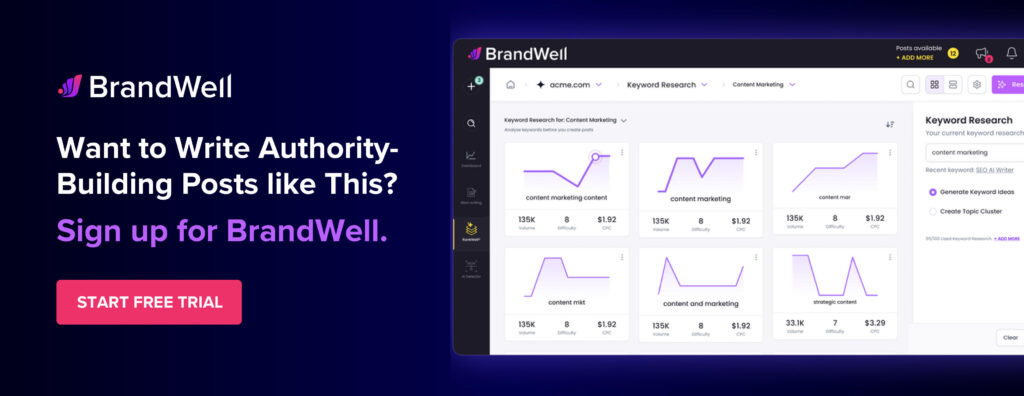Discover top guides, trends, tips and expertise from AIO Writers
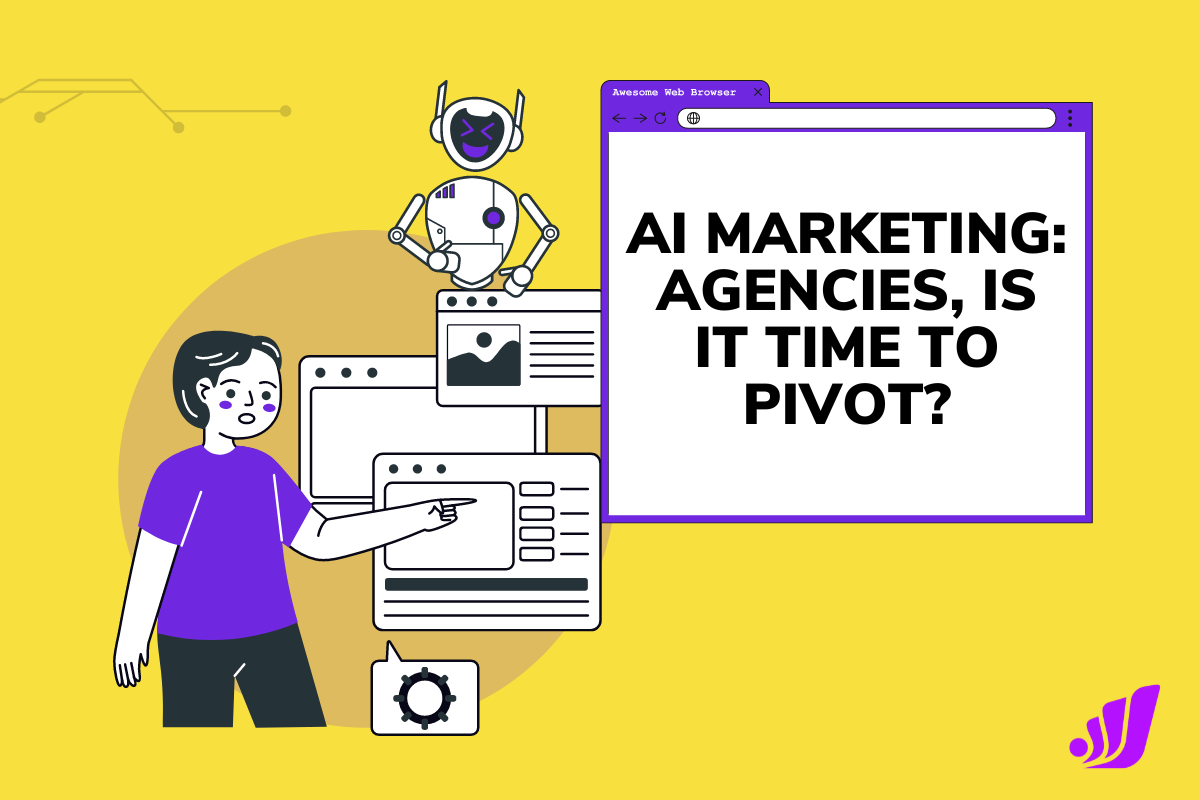
As digital marketers, there are many things that hold us back and stop us from truly thriving.
We have bottlenecks that slow us down and place a cap on how many clients we can serve at a time, and how much revenue we can bring in.
We have many challenges and tasks we want to improve upon to serve our clients better and boost our revenues. Challenges around:
- Creating content for traffic and lead generation
- Finding and keeping talent
- Staying within budget
- Scaling the business
- Retaining clients
In the future we dare to imagine after long, tiring days at the office, such challenges will not exist. There will be one magic bullet that solves all these challenges.
Well, ahoy marketers, thanks to AI that future has arrived. It is here. It does not quite solve all your problems (some still need to remain to make work stimulating), but AI will take the pesky ones away.
So why doesn’t it quite feel like nirvana? Why has your marketing agency struggled to fully embrace AI writers, for example, whose benefits for your business are so obvious?
Let’s talk about that today. The use of artificial intelligence in marketing!
AI for Marketers: What Does That Mean Really?
If you operate a digital marketing agency, I am pretty sure you have heard about ChaGPT, the fastest-growing consumer application in history.
Chances are good that all your clients have read about it, too, and maybe even have tried it and researched its use cases. The chatbot, which sent tremors as high up the food chain as Google, is smart and can respond to questions in a conversational, realistically human-sounding tone. A capability that enterprising content creators have adapted for article writing.
What you and your clients may also know is that there are artificial intelligence tools that are specially designed for and much more adept at content creation than ChatGPT. Like the brand growth tool BrandWell.
With BrandWell, you can generate a fully-formatted blog post, complete with metadata, table of contents, H2-H4 headers, internal and external links, and automatically inserted click-to-tweet links and key takeaway boxes, within minutes.
The benefits of using AI for automating content creation – a common challenge and HUGE overhead that hamstrings marketing agencies – are many and quite compelling.
At BrandWell, we have found that by using our tool, clients have:
All this while spending less than they did when they were using manual content creation processes. On average, clients are seeing 25x time savings over human-written content. If you add a dollar sign, the savings are barely believable.
The agency owners that we have signed up to use our tool are not going back. Not when they are saving so much money and getting so much of their time back.
The Power of AI in Marketing
AI is revolutionizing the marketing world. It’s transforming how businesses understand target audiences, customer behavior, and how to craft effective ad campaigns.
An interesting statistic to note: Less than a year after the explosion of generative AI, one-third of organizations are already using generative AI tools regularly.
Generative AI has captured the interest of the business community — across regions, industries, and seniority levels. Close to 80% of managers and business executives have some exposure to generative AI, and 22% are using it regularly for work.
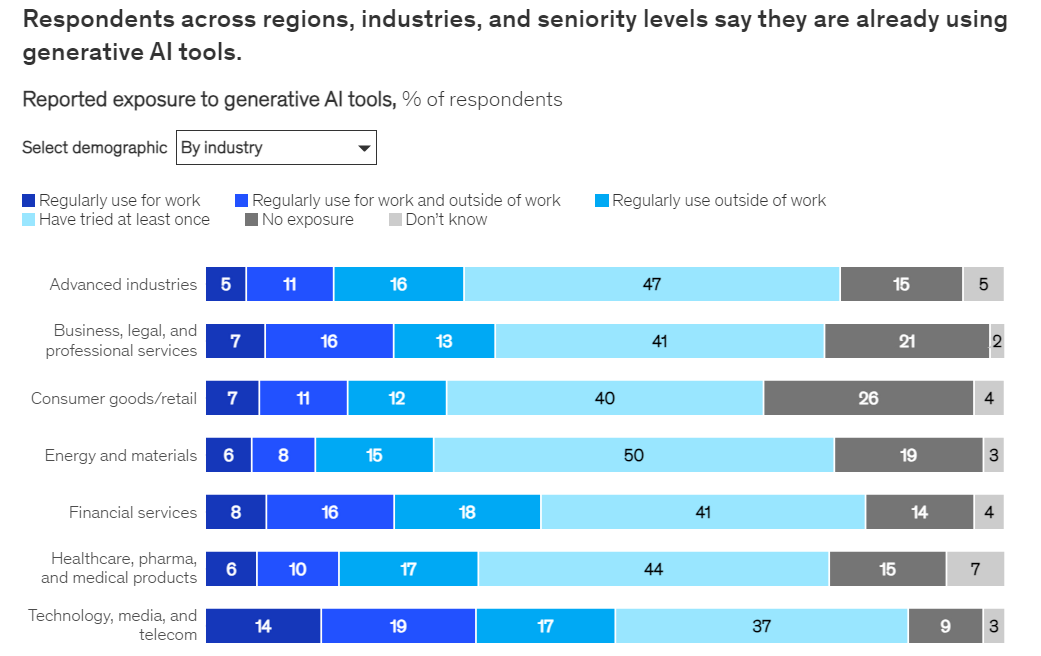

Source: McKinsey
What is AI Marketing?
Artificial intelligence in marketing refers to the use of AI technology to enhance and automate digital marketing efforts. This involves leveraging AI tools such as machine learning programs and deep learning algorithms to analyze big data, gain customer insights, and make data-driven decisions.
How do marketers use AI?
The increasing integration of artificial intelligence into marketing strategies has transformed the way businesses run their campaigns. From content generation to predictive analytics, AI is revolutionizing how we understand and engage with our target audiences.
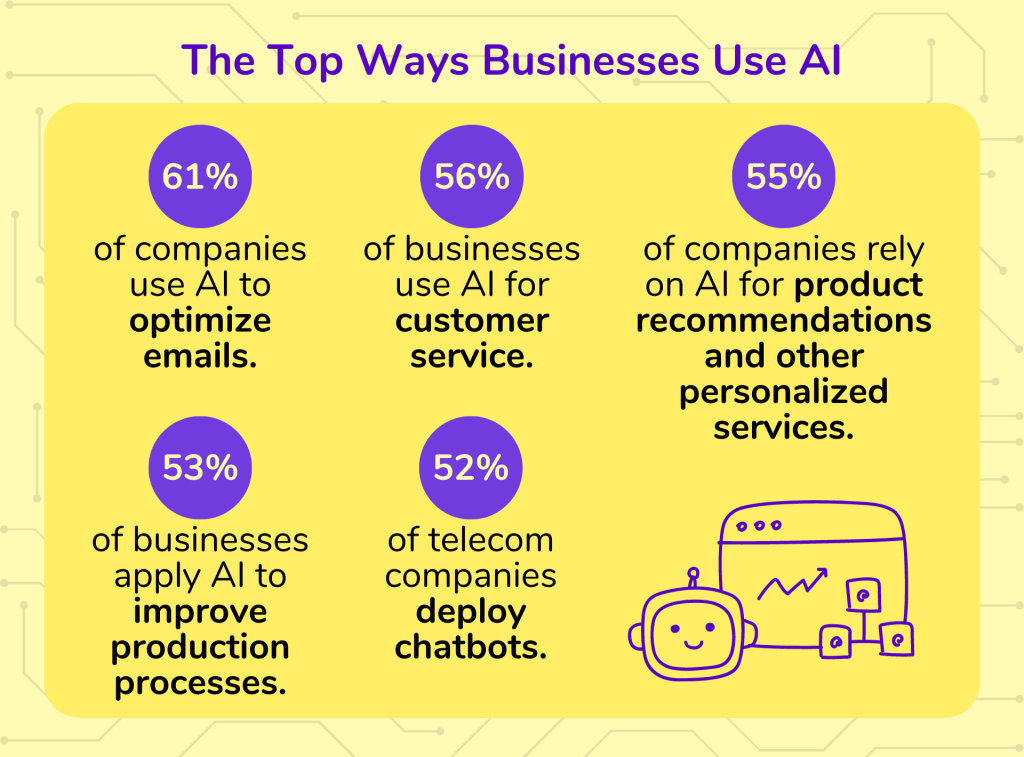

The top ways businesses use AI
Data Analytics
Data analysis is one area where artificial intelligence truly shines. With an overwhelming amount of customer data available today — thanks largely to big data technologies — sifting through all that information manually would be virtually impossible.
Enter machine learning. These sophisticated algorithms can process vast amounts of data quickly and efficiently, providing valuable insights about market trends and consumer engagement metrics that are instrumental when strategizing future campaigns or refining current ones.
Personalizing Customer Experiences
A key application of AI in marketing lies in personalization. By leveraging machine learning programs, marketers can analyze customer behavior and preferences to create a tailored experience for each user.
This ability extends beyond simple task automation; it allows for dynamic content changes based on individual user profiles including their name, occupation, and online behavior among others. This level of detail enhances the effectiveness of ad campaigns across various platforms from web pages to social media posts.
Content Generation
AI has also proven itself indispensable in content creation. Generative AI technologies are now capable of writing engaging blog posts, detailed product descriptions, and catchy social media captions — at scale — without losing out on creativity or relevance.
For example, BrandWell can generate an original, optimized, long-form blog post in a few minutes from a single keyword, a PDF or Word doc, an existing blog post, a YouTube video, and even a podcast episode. 🤯
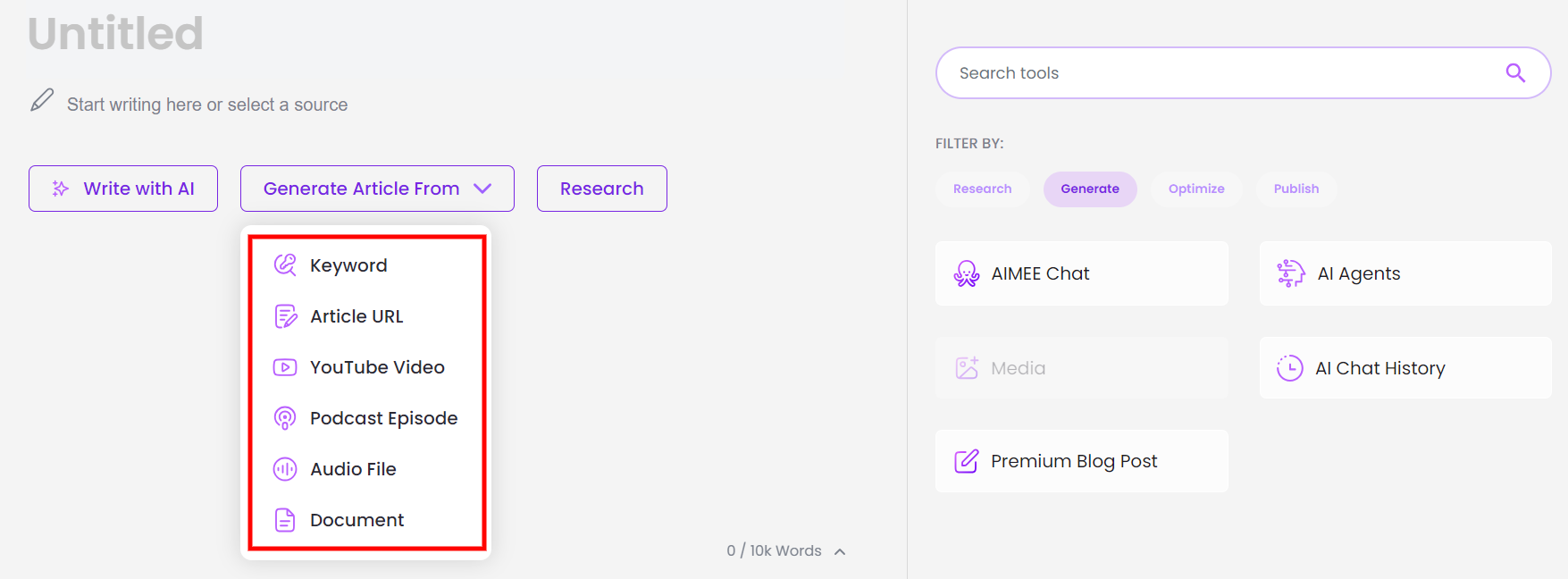

Predictive Analytics
Predictive analytics – another subset of artificial intelligence – allows businesses not only to understand past consumer behavior but also to predict future actions, enabling dynamic pricing models or customized product recommendations.
For instance, if predictive analysis shows increased interest in sustainable products among certain demographics, marketers can tailor their messaging accordingly, leading them down the right customer journey path.
Beyond guiding marketing strategy decisions, predictive analytics also helps drive customer engagement through real-time insights about how customers interact across various channels like social media posts or email newsletters. This allows brands to optimize these interactions at every touchpoint along the way, resulting in higher conversion rates by delivering timely messages when consumers are most likely receptive to them.
Sentiment Analysis
Sentiment analysis, once an arduous task for marketers, can now be executed easily using advanced AI technologies. This powerful tool provides real-time insights into consumer behavior patterns that significantly impact market research and strategy formulation.
Natural language processing (NLP), a subfield of machine learning, deals specifically with interactions between computers and human languages. This makes it ideal for sentiment analysis across various platforms, be it online reviews on your website or comments left by followers on your latest Instagram post!
Market Research
Last but certainly not least, market research becomes exponentially more efficient when done using advanced AI tools! Not only does this result in time-saving benefits, but it also provides deeper insights into potential changes within one’s market share, thus helping businesses adapt swiftly to the changing marketing landscape!
Enhancing User Interaction
Chatbots excel at one thing above all else — enhancing user interactions. Their capacity to engage with customers 24/7 transforms how businesses interact with their target audience, providing instant answers or directing users toward relevant resources on demand.
Beyond being responsive tools, these bots can be programmed to reflect your brand’s voice and personality across platforms consistently — an invaluable asset when it comes down to building trust and rapport with your audience.
Another crucial role that chatbots play, which often goes unnoticed, is collecting valuable data about user behavior during each interaction. These customer insights help marketers tailor content to individual users, leading to more accurate responses in the future.
This capability allows AI marketing teams to drive engagement by delivering highly targeted messages that resonate better with audiences, thus improving conversion rates from digital marketing campaigns.
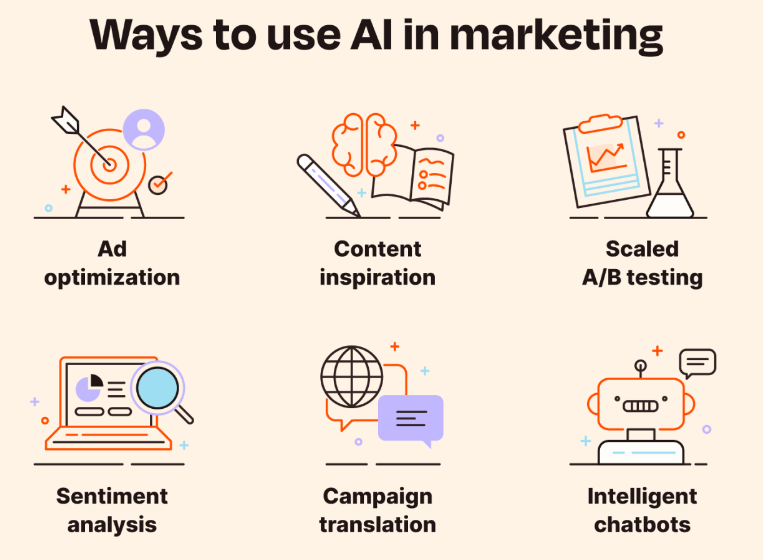

Screenshot from Zapier
AI Marketing Pros and Cons
The adoption of AI in marketing is reshaping the way businesses approach their digital marketing efforts. But like any other technology, AI comes with its own set of advantages and disadvantages.
Let’s start with the pros.
Personalization
AI’s ability to analyze vast amounts of customer data allows marketers to create highly personalized experiences. This means tailoring content, product recommendations, and even communication timing to match each individual’s preferences and behaviors. This level of personalization increases engagement, builds customer loyalty, and ultimately drives conversions.
Efficiency
AI takes care of time-consuming and repetitive tasks such as data analysis and customer segmentation that would otherwise occupy marketers’ valuable time. By automating these processes, marketers can focus on strategic thinking, creativity, and crafting campaigns that truly resonate with their audience.
AI for small business marketing especially can help streamline tasks so you can focus on the bigger picture.
Data Insights
The sheer volume of data available today can be overwhelming. AI can quickly process and analyze this data, extracting meaningful insights. These insights help marketers understand customer behaviors, preferences, and trends.
Armed with such information, marketers can fine-tune their strategies, make informed decisions, and adjust their campaigns to stay relevant.
24/7 Engagement
AI-powered chatbots and customer service tools ensure that customers receive timely assistance and support, even outside of regular business hours. This round-the-clock engagement enhances the user experience and prevents potential frustration when customers can’t find the help they need.
Predictive Powers
AI algorithms are designed to identify patterns and correlations in data. This predictive capability allows marketers to anticipate future trends and customer behaviors. By leveraging these insights, businesses can adjust their marketing strategies ahead of time, maximizing their competitive edge and capturing emerging opportunities.
Despite these advantages, AI marketing also comes with its set of drawbacks.
Learning Curve
Integrating AI systems into your business operations may require staff training and hiring of specialized personnel.
Implementing new technologies can be challenging, especially for businesses that are new to AI, and might require a learning curve.
Data Privacy Concerns
Personalization relies on collecting and analyzing customer data, which can raise privacy concerns. Businesses must be diligent in adhering to data protection regulations (like GDPR or CCPA) to ensure that customer data is handled ethically and securely.
High Initial Costs
Implementing AI technology can come with significant upfront costs, including software development, training, and system integration. For smaller businesses with limited budgets, these initial expenses can be a barrier to entry.
Lack of Human Touch
While AI can automate many tasks, it may lack the empathetic and emotional connection that human interaction brings. Over-reliance on AI might lead to a sterile customer experience, which could impact brand perception.
In terms of content creation, AI-written blog articles may also sound mechanical and lack emotion and empathy — two important components of persuasive writing.
Inaccuracies and Bias
AI systems learn from historical data, and if that data is biased or inaccurate, the machine can perpetuate these biases or produce flawed outcomes. Careful monitoring and validation are necessary to ensure AI-generated content and recommendations are fair and accurate.
Artificial intelligence offers immense potential to transform marketing strategies, but it’s crucial to be aware of its benefits and limitations. Successful integration requires careful consideration of business goals, resources, and ethical implications to harness AI’s power effectively.
Examples of AI Marketing
Some of the biggest names in business have effectively integrated AI into their marketing strategies, including Netflix, Spotify, and Amazon. Here are their stories.
Netflix: Personalizing User Experience
Netflix uses AI algorithms to deliver a personalized customer experience to its subscribers. By analyzing users’ viewing history, the AI displays recommendations for upcoming movies or TV shows.
For instance, if you frequently watch films featuring Uma Thurman or John Travolta, Netflix will adjust the artwork for related recommendations to show their highlights. This strategy is aimed at improving conversion rates by tailoring content according to customer behavior.


Artwork Personalization at Netflix
Another way Netflix utilizes AI is through content generation. By using generative AI algorithms, Netflix can create dynamic trailers tailored to individual viewer preferences. This not only drives customer engagement but also allows for more effective ad placements.
Beyond content creation, Netflix integrates AI into its market research process with machine learning programs analyzing vast amounts of big data collected from viewers’ interactions on the platform. These tools provide valuable insights into audience viewing habits and preferences which are then used to shape future marketing campaigns.
In addition to enhancing user experiences on their own platform, Netflix leverages artificial intelligence for social media posts too. Through sentiment analysis powered by natural language processing, they gain an understanding of how audiences perceive their brand across different social platforms which helps them tailor messaging accordingly.
Predictive analytics, another facet of machine learning, allows Netflix to anticipate what customers will want next based on previous behaviors or trends identified within collected data sets. This enables content delivery at scale while maintaining a high level of personalization throughout each phase of the customer journey.
Spotify: Music Recommendations from Machine Learning
Likewise, Spotify employs machine learning programs for content personalization based on users’ music interests, podcast favorites, and more. They use big data analysis combined with deep learning techniques for effective ad targeting.
Spotify’s advanced AI tools allow them not only to drive customer engagement but also to gain valuable market share in the competitive streaming industry.
The world’s biggest music streaming platform has been leveraging AI to enhance its marketing campaigns. The integration of these advanced technologies into their digital marketing efforts offers an unparalleled, personalized customer experience.
One way Spotify uses artificial intelligence is through content generation. Using generative AI algorithms, they are able to create customized playlists for each user based on their listening habits. This not only improves the customer experience but also drives more engagement by providing them with tailored experiences.
Apart from personalizing content, Spotify utilizes predictive analytics to gain valuable insights into customer behavior. By analyzing big data collected from users’ activities on the platform, they can make automated decisions about what songs or artists to recommend next.


In addition to enhancing the user experience within its app, Spotify extends its use of artificial intelligence technology onto social media platforms as well. They leverage this technology when creating effective ad campaigns targeted at specific audiences on Facebook and Instagram.
Lastly, NLP enables sentiment analysis which helps Spotify understand how customers feel about certain songs or artists based on reviews and comments left by users across various online platforms. This invaluable insight allows marketers at Spotify to fine-tune their strategies accordingly, thereby optimizing results.
Amazon: Forecasting Sales
Amazon, the world’s leading e-commerce platform, has been a frontrunner in using AI marketing tools and machine learning programs to understand customer behavior and provide an unparalleled shopping experience.
The cornerstone of Amazon’s AI marketing strategy is personalization. By integrating advanced ML algorithms into its system, Amazon marketers can analyze vast amounts of customer data to gain valuable insights about individual preferences and shopping habits. This allows them to tailor product recommendations, creating a unique customer journey that drives engagement and increases sales.
Beyond simple task automation, Amazon uses predictive analytics to predict what customers will want next based on past behaviors and market trends. This enables the system to serve highly relevant ads that resonate with each user’s needs.


A key aspect where Amazon excels is implementing NLP, which powers Alexa. Amazon’s virtual assistant seamlessly interacts with users, thereby enhancing the overall customer experience.
By employing sentiment analysis on social media posts from consumers, the company is able to gauge public opinion about products and make data-driven decisions regarding brand positioning strategies based on these insights. This is why Amazon has remained the leader in market share amidst the changing marketing landscape.
Besides these major players, several other companies across various sectors are implementing AI-powered tools into their marketing campaigns — from dynamic pricing models powered by predictive analytics algorithms to generative AI media posts and sophisticated market research conducted by intelligent bots.
6 AI Marketing Fears, Some of Which Are Actually Opportunities
I get it, change produces fear. Some of the fears around AI are actually well-founded, but even they can be addressed.
That AI writers can take 4 minutes to write an article that takes a human writer two days to research and write is itself scary. Until you consider other things that were unimaginable before the internet.
Just like businesses that saw social media as a fad and ignored it at first missed an opportunity to build a presence on a marketing channel that has since generated billions in revenue for businesses, there are some fears you must quickly shake off.
Fear #1. AI Will Put Writers Out of Work
Even though you may be seriously considering automating content writing and scaling content creation with an AI writer, you may be apprehensive about letting go of writers that you have come to treat as family.
Indeed, AI writers will replace human writers. But only those that refuse to adapt. How do they adapt, though?
Opportunity: Evolve with AI and step into a new role.
AI content is not perfect. While the draft written by BrandWell is almost publish-ready, it still needs that human touch to turn it from good to great.
This means you can still keep your human writers. And instead of paying them less, you can 5-10x scale content creation while paying roughly the same in wages. It’s a compelling argument for adopting artificial intelligence in marketing.
Fear #2. AI Content Will Attract a Google Penalty
For a long time, Google had a policy against what it called ‘automatically generated content’. It considered it to be spam.
Google no longer cares about how your content is produced. It only cares about its quality. In Google-speak, your content only needs to be ‘helpful, reliable, and people-first‘, not crafted with the sole purpose of gaming search engines and tricking them into underserved high rankings.
As long as your AI articles are comprehensive, helpful, and aligned with search intent, they will rank.
Google has stopped short of giving AI content the thumbs up. Not that it needs to since we know it has been using AI and machine learning in its systems for some time now.
In case you are asking, then Google likely can detect it if your content is AI-written. If anyone out there has the tech to do it accurately, it will probably be Google. But you shouldn’t worry too much about it if you are using BrandWell because our AI is trained to write in a human-sounding tone. At least enough to pass AI detection.
We have a ‘Product Hunt Product of the Day’, free-to-use AI detector on our website in case you want to check if your AI-generated draft passes detection as AI-written:
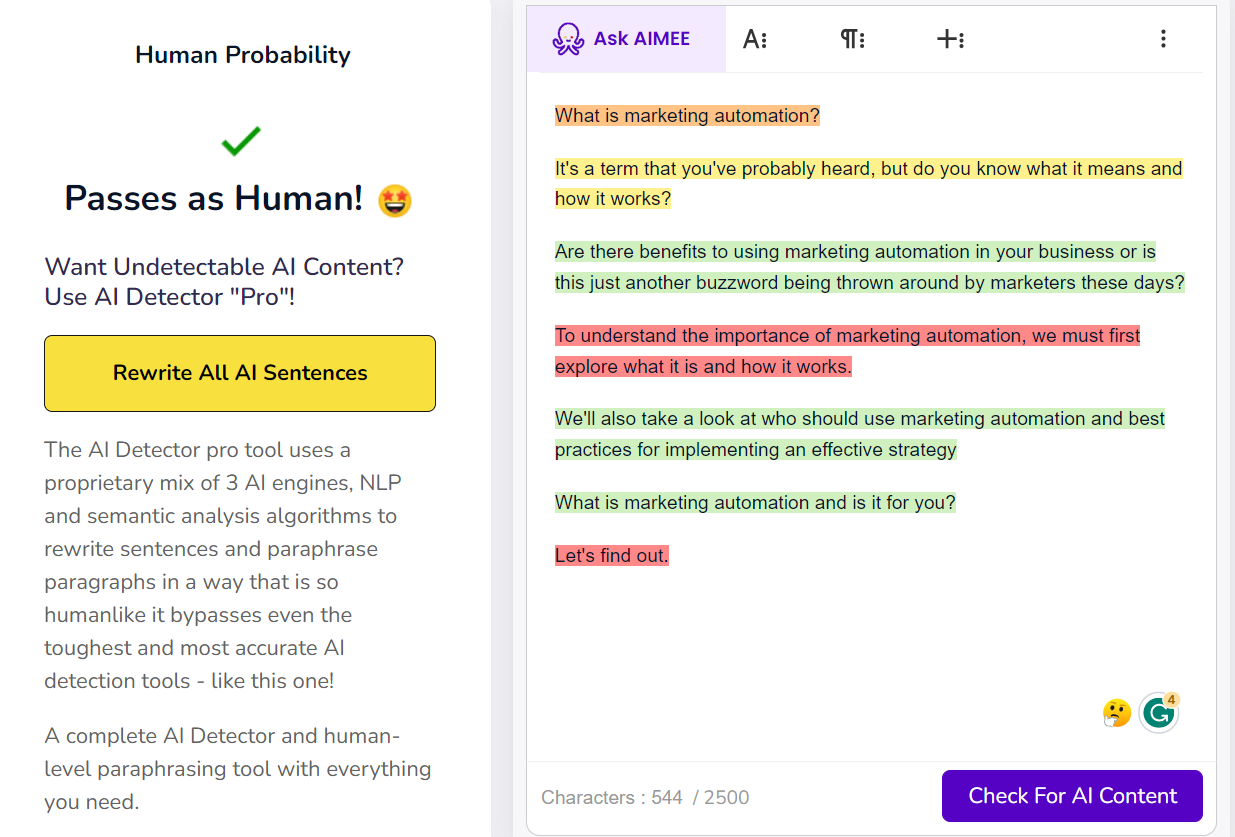

Back to content quality, human or AI-written, if your AI content is poorly written, targets no one, and offers no original ideas, it simply won’t rank. That’s about the only punishment Google will mete out.
So where’s the opportunity?
Opportunity: Create better, audience-focused content
According to research by Capterra:
‘82% of marketers say content generated by AI or ML software is just as good (or better!) than human-generated content.’
The greatest benefit of AI writing tools, apart from the time and cost savings and improved efficiency, is predictable content quality. With an AI writer, you know the quality of the content you get does not change wildly.
Since you know that Google’s standards on content quality are high, you will be more motivated to raise the quality of your own content. But you won’t have to try that hard because the AI does most of the heavy lifting for you.
The cost and time savings you make through automation mean you can invest in better graphics, spend more time fact-checking, adding statistics and enhancements to build trust, and humanizing and optimizing your AI content to elevate and make it more relatable and visible to more people.
Fear #3. AI Writers Cannot Tug at the Heartstrings of Readers
AI writers don’t have feelings and cannot understand them. They, therefore, cannot express empathy or stir emotions, or cheer a reader who is down on their luck and needs a pick-me-up. Those things are hard to train AI tools on.
So, guilty as charged, AI content lacks sensitivity. But that’s not a bad thing:
Opportunity: Detach yourself from your content and focus on facts
As writers, we too often get distracted by our own emotions and spend too much effort trying to convince instead of simply informing. We let emotions lead logic, doing a great disservice to the reader.
Sometimes readers want their information served raw, uncolored, and free from the entertainment of story and our inherent desire to sell and appeal to the heart than reason and utility.
AI can’t do that. It just lays the facts bare. So in a way, it allows us to detach ourselves from the content and focus on facts. No need to worry about watering down your brand voice and the lack of emotion as long as the goal is to be as informative as possible.
Fear #4. AI Writing Tools Sound Like Bots
AI-generated content does tend to sound robotic. It can be stiff and mechanical. In other words, it can be boring to read.
The last thing you want is for your content to put readers to sleep. That’s not how you create a tribe of loyal readers and generate an endless stream of leads. So for this fear, there is no opportunity. We can’t think of any.
What we have, though, is a solution.
Solution: humanize AI content.
Fear #5. Reputational Risk from Made-Up Facts
Frankly, this problem has been made more of an issue than it is. We can thank ChatGPT for that.
Seriously, though, you are a lot less likely to find hallucinations in content written by BrandWell than in a ChatGPT-written text.
And again, with the chatbot upgrading to GPT 4, you should see a lot fewer made-up facts in ChatGPT texts.
But we are talking about AI writers, not AI chatbots. You can be reasonably certain that your AI-written content will not cite non-existent facts.
We urge you to review your AI-generated drafts for factual accuracy.
Fear #6. – Unintended Plagiarism
You are not writing the content yourself. So how can you be sure that your content is not plagiarized?
Plagiarism – taking someone’s creative work and passing it off as your own – is a serious problem in web publishing. We feel so strongly about it we built a filter for it within our AI writer.
BrandWell has a plagiarism checker baked in (and a standalone version too). No need to copy and paste the draft into a separate tool to verify if it is original. Just click on the Research tab right inside the app and request a plagiarism scan.
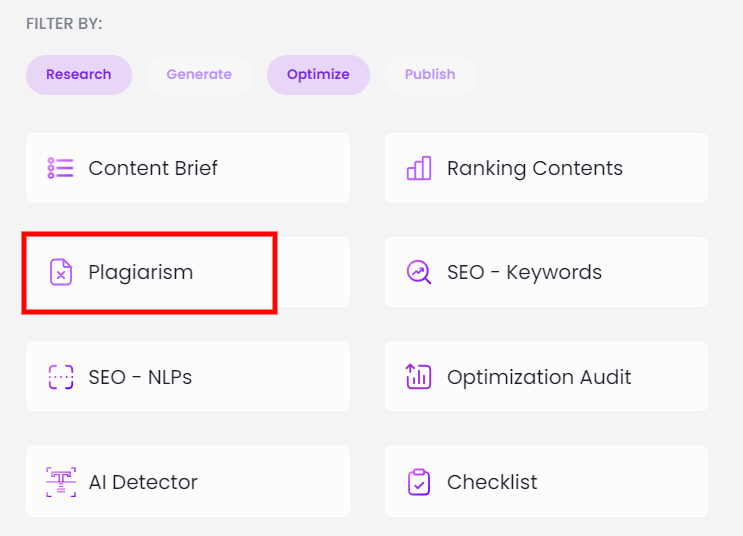

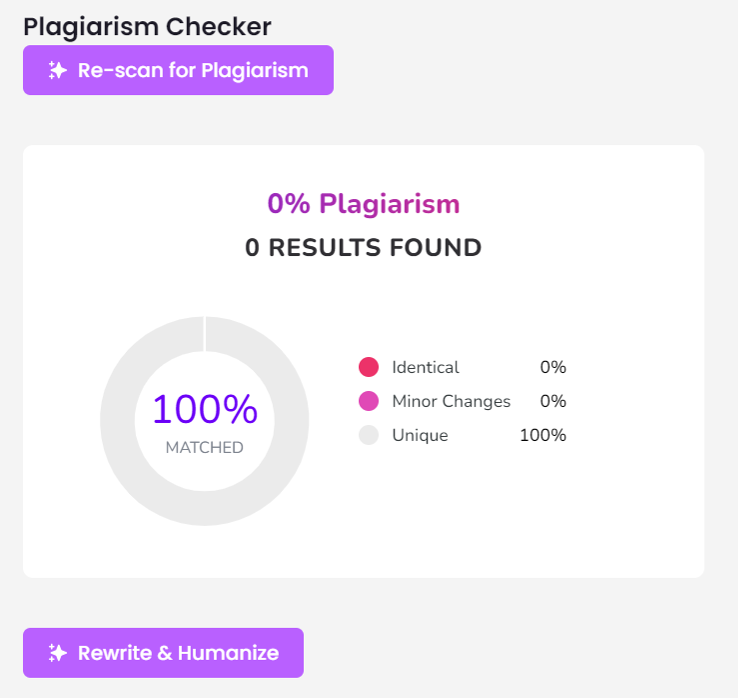

How to Break It to Your Customers You’ve Gone AI
Have I managed to convince you to go all in on AI?
Hopefully, yes. If not, consider these statistics from the same Capterra study we cited earlier
88% of marketers find that AI or ML software saves their company time and money.
Many of our agency customers have found this to be true. We are hearing of 10-25x savings over the cost of human-only content. Time savings are in the same ballpark.
There is nothing your customers want more than more zeros on their bottom line. That is if you pass some of the savings you make down to them. And why shouldn’t you when you are saving so much?
After improved profits, your customers want nothing more than better, more digestible content, especially as it equals better marketing:
Almost half (49%) of marketers say AI or ML software is very successful at producing clear or easy-to-read content.
Back to your marketing agency, how much time do you spend creating content? Not for your customers, but for your own marketing? Here’s what your peers say:
45% of marketers say they spend about half of their time creating marketing content in a typical workweek.
And – mind your jaw, it might hit the floor – this:
More than a third of marketers are spending about 75% of their total time on content work.
You may be spending as much time or more time creating content yourself without realizing it. If not that, you are wondering where you can cut costs to boost profits.
If that’s the case, how much time are you spending on strategy? On serving customers?
No wonder why many growth marketing agencies say that retaining clients is an enduring struggle.
Automate with AI, Thrive, and Grow
Here’s what happens when you ignore the growing influence of artificial intelligence in marketing:
Your competitors will jump in ahead of you.
Soon those agencies will be pricing you out of work as they pass on their savings to customers. Those that will recognize the power of AI writers to save time, not just costs, will streamline their processes. That will mean they no longer struggle to meet deadlines, which means happier customers.
Meanwhile, your customers are getting ever more frustrated. Try to push your writers to write more and you risk burning them out, leading to more missed deadlines and frustrated customers.
Do you worry that your customers will run for the hills if you told them that their content is now written by a machine? Not if the quality of the content is better and the content itself is delivered on time. Like Google, that’s all they care about.
FAQs – AI Marketing
What is AI marketing?
AI marketing involves leveraging artificial intelligence to automate, optimize, and personalize marketing strategies. It helps businesses understand customer behavior, target audiences effectively, and drive growth.
How to earn money with AI marketing?
Earning money with AI marketing involves using tools like predictive analytics for targeted advertising or personalized content creation. This leads to increased engagement rates, conversions, and ultimately higher revenues.
What is the best example of AI in marketing?
A prime example of AI in marketing is Netflix’s use of generative algorithms for personalizing user interfaces based on individual viewing habits, which enhances customer experience significantly.
How many companies use AI for marketing?
The exact number varies, but a report from Influencer Marketing Hub stated that 61.4% of marketers have used AI in their marketing activities, with 44.4% using AI for content marketing.
AI Marketing Is Not The Future. It’s Already Here.
AI is not a fad. It is not a far-off idea, a craze, or a trend that will soon die down. It is here to stay.
Albeit too soon for some, AI has moved from the futuristic to the here and now. Unless you jump on, it will disrupt and then consume your business.
Don’t fear AI marketing. It’s here to make your work less tedious and save you time and money. It’s built for your convenience. Use it to advance your work, cut costs, and serve a better, faster product to your customers. Because that’s what technology is all about.

UNLOCK YOUR POTENTIAL
Long Headline that highlights Value Proposition of Lead Magnet
Grab a front row seat to our video masterclasses, interviews, case studies, tutorials, and guides.

